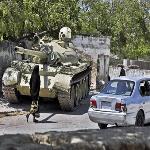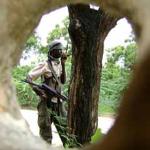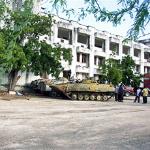02 February 2010

Photo: AFP
An African Union peacekeeping forces tank takes up a position near Mogadishu's State House as Pres. Sheikh Sharif Ahmed's Somali government commemorates the 1st anniversary under his rule (File)
January 29 was supposed to have been a day of celebration. In the sprawling presidential compound known as Villa Somalia, preparations had been made to mark the one-year anniversary of the new transitional government with poetry readings and a military parade.
But the country's most powerful Islamist insurgent group, al-Shabab, and an allied rebel group, Hizbul Islam, had something different in mind to mark the occasion.
The attack on government troops and African Union peacekeepers began around two o'clock in the morning with a crash of mortars and automatic machine gun fire, which could be heard from the south end of Mogadishu to the north.
The peacekeepers, who have a mandate to hit back if attacked, launched a counter-barrage, firing a combination of heavy artillery, Katyusha rockets and tank rounds into the inky blackness that gave cover to insurgents but left residents inside homes helpless to avoid the rockets and shells raining down around them.
When the fighting ended hours later, local hospitals reported that more than a dozen civilians had been killed and another 35 wounded. The government canceled the day's festivities.
It is a situation that has become all too familiar for residents in this embattled city. A U.N.-mediated deal in 2008, which added hundreds of moderate Islamists into the ranks of the government and ended Ethiopia's two-year occupation of Somalia, has yet to translate into safety and security for civilians.

AP
A Islamic fighter is seen through a hole caused by shrapnel in a wall, in Mogadishu, Somalia (File)The Transitional Federal Government, or the TFG, continues to be violently opposed by Islamist insurgents, most notably al-Shabab, which has proclaimed allegiance to al-Qaida. Al-Shabab militants, who control most districts in the capital and key towns throughout southern Somalia, have imposed their austere version of Islam in areas they have seized, shocking Somalis into submission with such punishments as public beheadings and amputations of limbs.
The only military force capable of keeping the government from being toppled is the 5,300 troops from Uganda and Burundi making up the African Union peacekeeping mission known as AMISOM. But since their arrival in Somalia in 2007, AMISOM troops, particularly from Uganda, have been severely criticized for retaliatory attacks, which have caused untold number of civilian casualties in Mogadishu.
Fartun Abdisalam Aden, who heads the Mogadishu-based human rights organization Elman Peace Center, says Somalis are no longer seeing a light at the end of the tunnel.
"People in the beginning of this government had hope. They were thinking, 'Things might get better," Aden said. "It will change.' Now, it is getting worse and nothing is working. I think the international community made a mistake. People are dying and people do not have hope anymore. Whomever you talk to, they think, 'Every year it is getting worse. What are we waiting [for] now?' We do not know," he said.
Government officials insist it could improve security and public services immediately if they had direct access to more than $200 million the international donor community pledged last year to support the TFG and the African Union mission.
First Deputy Prime Minister Abdurahman Aden Ibrahim "Ibbi" tells VOA most of the money that has been promised to the Somali government has been given to U.N. and U.S. government agencies for release to the government at their discretion. Ibbi says only a fraction of the pledged amount has been released so far.
"We are weak because the international community is not supporting this government the way it is supposed to," he said. "All the money that was supposed to be given to the Somali people has been given to international organizations. We have been defending ourselves for one year with no money. Today, they are saying, 'We are training.' Still they are not giving us money! We do not have any friends now, to be honest with you. If they are our friends, let them give us something concrete," said Aden.
A respected civil society leader Abdullahi Mohamed Shirwa agrees that there has been inadequate support for the TFG from the international community. He says that is because the international community - which has tried 14 times in the past two decades to create a central government for Somalia without the participation of Somalis at the grassroots level - is itself divided over how best to guide and work with the new transitional government.
"They cannot create a consensus among themselves to support the Somali government or the Somali peace process. Someone says, 'Go ahead.' Others are saying, 'No, no.' And they are fighting among us - Ethiopia-Eritrea, African Union-Arab League, European-American, whatever. They do not have a common policy toward Somalia," he said.
In 2008, when the United Nations spearheaded efforts to create a new transitional government composed of both TFG officials and members of a former Islamist opposition faction, the aim was to establish a government that had the political and religious legitimacy to bring about a national reconciliation and end nearly two decades of civil war.

AP
Personnel Armored Vehicles stand in front of Villa Somalia in Mogadishu (2006 file photo)Abdullahi Mohamed Shirwa says what the United Nations actually created was a government of bickering factions that could barely manage issues inside Villa Somalia, let alone the rest of the country.
"We talk many times to the international community. We told them Somalis cannot maintain 40 ministers and 550 parliament members. It is very huge. It cannot work," he stressed. "They are a lot of different groups. They are fighting amongst themselves day and night. The problem is the international community always engage in peace process and establish Somali governments, which have no legitimacy in the local communities. And after they establish it, they sit in Nairobi and say, 'Let us see how they do.' And they are not supporting it. They are saying, 'They [the government] are not transparent. They are not accountable to anybody.' Why didn't they think before the establishment [of the government]?" asked Shirwa.
The increasing threat of an al-Shabab takeover, continuing violence, and the inability of the Transitional Federal Government to act decisively are driving Somalis out of Mogadishu and the rest of the country at an alarming rate. In parts of central and southern Somalia, the crisis is also fueling movements among groups aligned with the TFG to create autonomous administrations that can provide public services and offer some degree of stability and protection from al-Shabab.